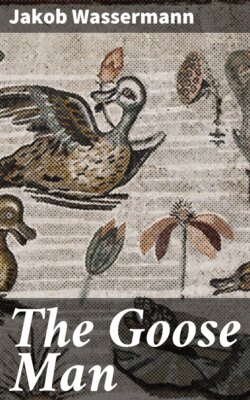Читать книгу The Goose Man - Jakob Wassermann - Страница 47
На сайте Литреса книга снята с продажи.
IX
ОглавлениеTable of Contents
In years gone by, Benda had known the theatrical manager and impresario Dörmaul. He went to Dörmaul now, and took Daniel’s new work along with him; for the versatile parvenu, who always had a number of irons in the fire, also published music.
A few weeks elapsed before Benda heard from Dörmaul: “Incomprehensible stuff! Crazy attempt to be original! You couldn’t coax a dog away from the stove with it.” Such was Dörmaul’s opinion.
A young man with fiery red hair followed Benda to the door and spoke to him. He said his name was Wurzelmann and that he was a musician himself; that he had attended the Vienna Conservatory, where his teacher had given him a letter of recommendation to Alexander Dörmaul. He also told Benda that Dörmaul was planning to form an opera company that would visit the smaller cities of the provinces, and that he was to be the Kapellmeister.
He spoke in the detestable idiom of the Oriental Jew. Benda was politely cold.
The main point was still to come: “Vineta” had aroused Wurzelmann’s profound admiration; he had read the score on the side: “A great talent, Doctor, a talent such as we have not had for a long, long while,” said Wurzelmann.
“Yes, but what am I to say about Herr Dörmaul’s opinion?” asked Benda. He found it difficult to trust the man before him, and was using the judgment of the man behind him as a foil.
“Don’t you know Dörmaul? I thought you did. Whenever he has no authority to fear he becomes very bold. Lay the Ninth Symphony before him without Beethoven’s name to it, and he will tell you at once that it is rubbish. Do you want to bet?”
“Honestly?” asked Benda, somewhat concerned.
“Give me the score, and I’ll promise you to arouse the least sensitive from their lethargy with it. With a work of that kind you have got to blow the trumpet.”
Benda thought it over. He had no use for trumpet-blowing, and no confidence in those who did the blowing. And yet he consented, for he did not feel justified in arbitrarily depriving Daniel of a chance.
It turned out that Wurzelmann had told the truth. A fortnight later Daniel was informed that the Orchestral Union had decided to perform his work in February. In order to provide its hearers with a more elaborate picture of his creative ability, the Union asked him for a second work. His compositions were perfect; others needed revision.
Wurzelmann boasted of having won his way to the seats of the mighty. He had the cordial approval of such professors of music as Wackerbarth and Herold. His masterpiece of diplomacy lay in the fact that he had secured Andreas Döderlein as director of the orchestra.
His store of suggestions was inexhaustible, his plans without number. He mentioned the fact that when the company was on the road they would have to have a second Kapellmeister, since he himself would have to function at times as substitute director: “Leave it all to me, dear Nothafft,” he said, “Alexander Dörmaul has got to dance to my tune, and my tune is this: It is Nothafft or nobody for Kapellmeister.”
If he began with humility, he concluded with familiarity. Daniel hated red-headed people, particularly when they had inflamed eyes and slobbered when they spoke.
“He is an unappetising fellow, your Wurzelmann,” he said to Benda, “and it is embarrassing to me to be indebted to him. He imagines he flatters me when he speaks contemptibly of himself. What he deserves is a kick or two.”
Benda was silent. Touched by Wurzelmann’s devoted efforts, he had called him servule, or the “little slave.” It was pleasant to think that there was some one to remove the stumbling blocks from the road, so that the feet of him who had risen from obscurity might find a place to walk. But the little slave was filled with the admiration of the Jew, born in poverty and oppression, for the genius of the other race.
Benda knew this. He was uneasy at the thought of it; for other and no less disingenuous fanatics regarded Wurzelmann’s behaviour merely as a racial peculiarity.
